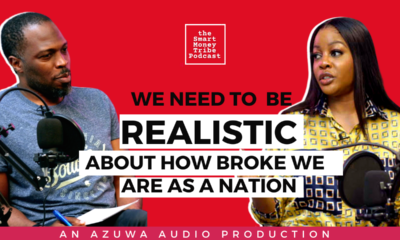Career
Ada Obiako: 3 Money Mistakes That Lead Women Into Debt
 Last year, I read “The Smart Money Woman” by Arese Ugwu. It was an entertaining and educational read. I picked several financial wisdom nuggets from that book and added to the ones I had already learned over the years. Today’s post is close to my heart because I know many women struggle when it comes to good money management practices (I myself was awful at it for a good period of my life). I am not a financial management expert; however, I want to share 3 money mistakes I’ve made in the past that you’d do best to avoid.
Last year, I read “The Smart Money Woman” by Arese Ugwu. It was an entertaining and educational read. I picked several financial wisdom nuggets from that book and added to the ones I had already learned over the years. Today’s post is close to my heart because I know many women struggle when it comes to good money management practices (I myself was awful at it for a good period of my life). I am not a financial management expert; however, I want to share 3 money mistakes I’ve made in the past that you’d do best to avoid.
Tracking ‘Zero’ Expenses
I was quite terrible at this. I had no account of the money I spent – how much, to what product or service, when, why, etc. I operated under a pseudo-safety net; assuming that since I considered myself a modest spender, then I was probably always fine and anything I spent money on was fine. This wasn’t always the case. For many months, I ended up spending more than I expected I would – on items that were unnecessary, and couldn’t account for several of the expenses.
An expense tracker is essential (you can do this the ol’ school way by paper and pen or by using an excel spreadsheet or any mobile app that can support this). Once you start tracking your expenses, you will be able to properly assess how much money leaves your account daily, what specific items/bills/luxuries/etc you spend it on, and most importantly what your major cost drivers are (the things you end up spending the most money).
If you keep up with this practice, it will be easy for you to review this information at the end of each month, notice poor spending habits / unnecessary purchases, and commit to better money choices in future.
Balling on No Budget
Now this is funny. This is for us ‘high time choices’ that have deluded ourselves into thinking that budgets are boring and restrictive, and we can do “bad all by ourselves” without them. Oh no, Senoritas! Budgets are an essential part of good financial management. It’s necessary to setup a monthly budget that clearly outlines how much of your income goes to bills and basic amenities, how much goes to your savings account (in the event that an emergency, health or otherwise occurs, and you need immediate cash support), how much goes to your investment account (if you have one for stocks, property, or business investment ventures), and how much you can afford to set aside for “luxury” spending (dinners at fancy restaurants, Malaysian hair, etc). Budgets help you create structure and organization when it comes to money – helping you to prioritise “needs” first and then “wants” second.
Everyone benefits from keeping budgets. Whether your monthly income is N40,000 or N40,000,000 — you need a budget (moreso if you’re one of the “upper echelon” whose earnings make it much more tempting to spend frivolously).
Stunting Like Your Richer Friends
I remember a time when I was broke. My monthly income barely covered my bills and I was penny-pinching for dear life. Beforehand, I had been a “stutter” – frequenting restaurants on a daily basis, clubs every weekend (with their overpriced entrance fees and drinks ($10 for a Long Island Iced Tea!), splurging on weaves, because you know I had to have my hair “laid”, and buying items at random for the heck of it.
Of course, I kept all of this up with my bandwagon of “merry go lucky” friends. However, things change when a bit of broke-ness sets in. You begin to realize that many of those “friends” are only willing to stick around when the drinks and dancing nights are plentiful. Many of those “friends” are not willing to provide anchor and support when you are drowning in financial debt – they might even assist you in plunging further.
The good news is, I accepted this lesson swiftly. When I noticed my pockets were becoming abysmal, I quickly changed my spending behavior. I cut down restaurant trips to once a week (if that), removed club outings completely (you’ll be surprised how much money you save if you’re not buying new outfits each week or paying entrance fees or buying drinks), and controlled my itch to buy unnecessary items because I wanted them. The great news is that during this period I was able to filter out the quality friends from the “merry go lucky gals” and still found ways to have fun and enjoy myself while being money-cautious (indoor dinner and movie nights with friends, free event outings around town, etc).
If you’re currently stuck in “stutter” mode and feel there’s no hope out of it, please know that it is in your best interest (peace of mind, no debt) to free yourself of this form of bondage. If you’re worried about losing those “richer” friends, the question you should ask yourself is: are they really my friends if I feel the only way to keep them is to lead myself into debt?
There you have it folks.
Any additional financial management tips you know that have worked wonders for you?
I’d love to know.
Photo Credit: Photographerlondon | Dreamstime.com
























